The Intel 9th Gen Review: Core i9-9900K, Core i7-9700K and Core i5-9600K Tested
by Ian Cutress on October 19, 2018 9:00 AM EST- Posted in
- CPUs
- Intel
- Coffee Lake
- 14++
- Core 9th Gen
- Core-S
- i9-9900K
- i7-9700K
- i5-9600K
Gaming: Ashes Classic (DX12)
Seen as the holy child of DirectX12, Ashes of the Singularity (AoTS, or just Ashes) has been the first title to actively go explore as many of the DirectX12 features as it possibly can. Stardock, the developer behind the Nitrous engine which powers the game, has ensured that the real-time strategy title takes advantage of multiple cores and multiple graphics cards, in as many configurations as possible.
As a real-time strategy title, Ashes is all about responsiveness during both wide open shots but also concentrated battles. With DirectX12 at the helm, the ability to implement more draw calls per second allows the engine to work with substantial unit depth and effects that other RTS titles had to rely on combined draw calls to achieve, making some combined unit structures ultimately very rigid.
Stardock clearly understand the importance of an in-game benchmark, ensuring that such a tool was available and capable from day one, especially with all the additional DX12 features used and being able to characterize how they affected the title for the developer was important. The in-game benchmark performs a four minute fixed seed battle environment with a variety of shots, and outputs a vast amount of data to analyze.
For our benchmark, we run Ashes Classic: an older version of the game before the Escalation update. The reason for this is that this is easier to automate, without a splash screen, but still has a strong visual fidelity to test.
| AnandTech CPU Gaming 2019 Game List | ||||||||
| Game | Genre | Release Date | API | IGP | Low | Med | High | |
| Ashes: Classic | RTS | Mar 2016 |
DX12 | 720p Standard |
1080p Standard |
1440p Standard |
4K Standard |
|
Ashes has dropdown options for MSAA, Light Quality, Object Quality, Shading Samples, Shadow Quality, Textures, and separate options for the terrain. There are several presents, from Very Low to Extreme: we run our benchmarks at the above settings, and take the frame-time output for our average and percentile numbers.
All of our benchmark results can also be found in our benchmark engine, Bench.
| Ashes Classic | IGP | Low | Medium | High |
| Average FPS | 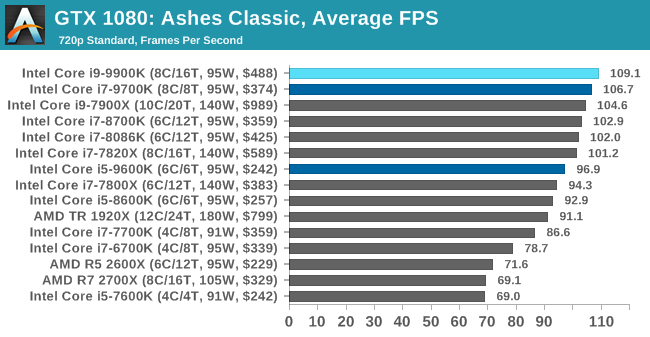 |
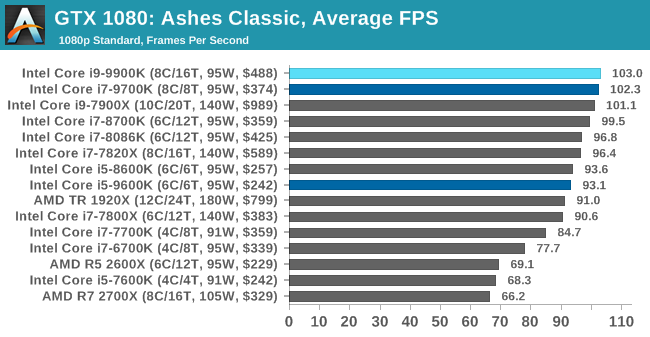 |
 |
 |
| 95th Percentile | 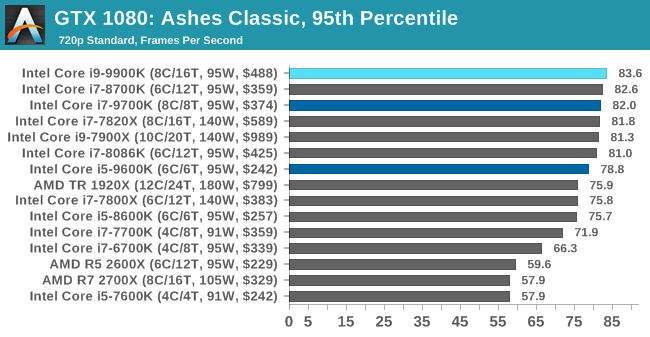 |
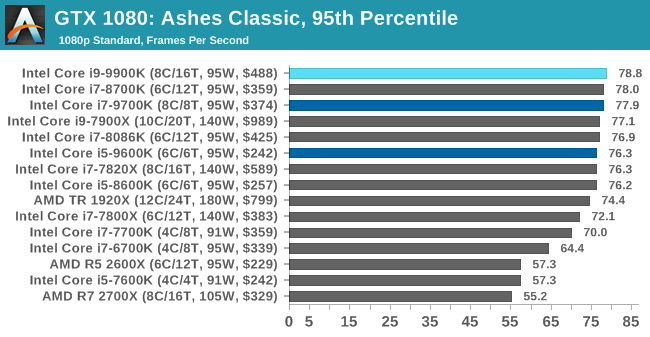 |
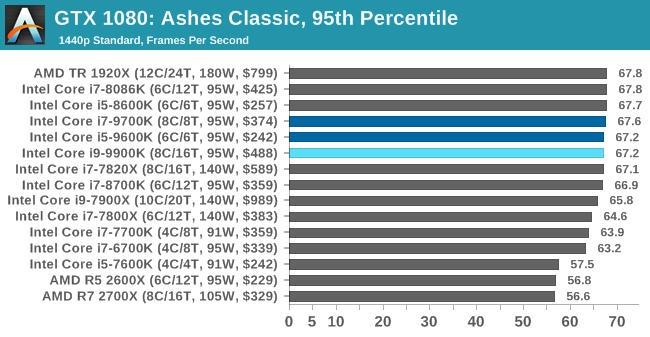 |
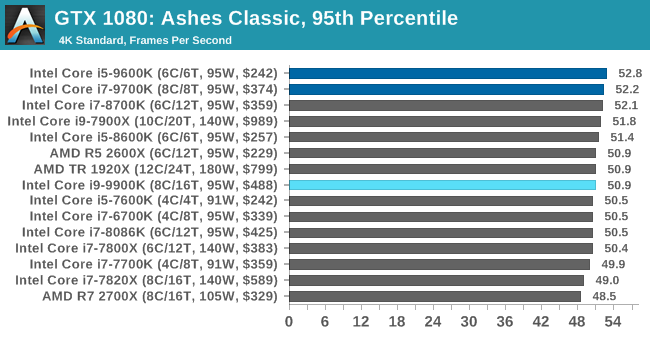 |
As a game that was designed from the get-go to punish CPUs and showcase the benefits of DirectX 12-style APIs, Ashes is one of our more CPU-sensitive tests. Above 1080p results still start running together due to GPU limits, but at or below that, we get some useful separation. In which case what we see is that the 9900K ekes out a small advantage, putting it in the lead and with the 9700K right behind it.
Notably, the game doesn’t scale much from 1080p down to 720p. Which leads me to suspect that we’re looking at a relatively pure CPU bottleneck, a rarity in modern games. In which case it’s both good and bad for Intel’s latest CPU; it’s definitely the fastest thing here, but it doesn’t do much to separate itself from the likes of the 8700K, holding just a 4% advantage at 1080p. This being despite its frequency and core count advantage. So assuming this is not in fact a GPU limit, then it means we may be encroaching on another bottleneck (memory bandwidth?), or maybe the practical frequency gains on the 9900K just aren’t all that much here.
But if nothing else, the 9900K and even the 9700K do make a case for themselves here versus the 9600K. Whether it’s the core or the clockspeeds, there’s a 10% advantage for the faster processors at 1080p.


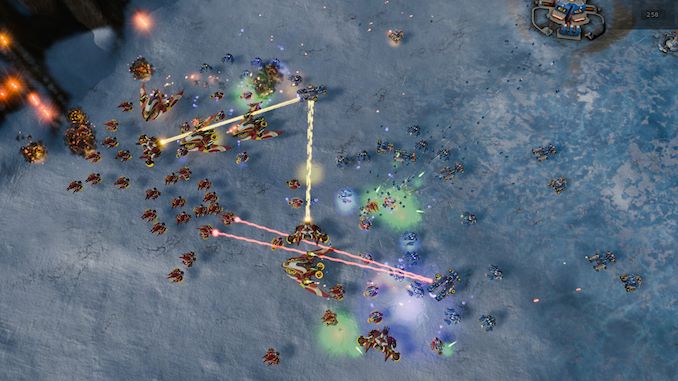









274 Comments
View All Comments
SanX - Thursday, October 25, 2018 - link
How come i7-7800x outperforms i9-9900 by the killing factor of 3-4 in particle movement? Is it not as "hand tunable" as older gen chips?davidk3501 - Thursday, October 25, 2018 - link
This is an overclockable processor, allowing users to push the frequency if the cooling is sufficient, and despite the memory controller still rated at DDR4-2666, higher speed memory should work in almost every chip. The Core i9-9900K also gets a fully-enabled cache, with 2 MB available per core for a chip-wide total of 16 MBashlord - Thursday, October 25, 2018 - link
My son's 4690K just blew up at such a shitty time. 8th gen 8400 is a decent replacement but 9th gen is out, so I don't really want to buy a previous gen item. I am guessing the '9400' will be out in a month or two. Going the AMD route has its issues too. It seems that AMD processors still have some issues with virtual appliances built using an older kernel. And in the past 30 years of computer ownership, I have never upgraded the processor. Components like motherboard or ram usually fail way before the CPU goes poof.In my country, R5 2600 w/Gigabyte Aorus B450M, 16GB of TridentZ RGB and a Cryorig M9+ goes for S$751. 8400 with MSI H310M Pro-M2, G.Skill Ripjaws V2400 and the same cooler goes for S$710.
ARgh!!! Don't know what to choose! Or maybe I should just give him my 6700K and get myself a new shiny toy.
nukunukoo - Friday, October 26, 2018 - link
I'm glad competition from AMD is back. Just a little over three years ago, an 8-core Intel would be a Xeon costing an arm and a leg!Dragonrider - Monday, October 29, 2018 - link
Just a note re the IGP. If you are going to try to watch 4k Blu-ray on your computer, you NEED that Intel IGP. I don't think there is any other solution to the DRM. For some, that alone would be a reason to get the Intel processor, all else being in the same ballpark.y2k1 - Wednesday, October 31, 2018 - link
What about performance pet watt? Is it basically the same as last gen?hanselltc - Thursday, November 1, 2018 - link
wat bout 9700k vs 9900k in gaming thoAlways_winter - Wednesday, November 28, 2018 - link
what cpu cooler did you usepoohbear - Monday, December 10, 2018 - link
Wow that 10nm CPU is taking forever eh? AMD is to release 7nm CPUs next month, and intel can't produce 10nm in 2019? What happened exactly?ROGnation7 - Saturday, February 23, 2019 - link
Watching all these benchmarks nowadays and taking count on how well optimised games are these days , at last the AAA titles , makes you think if it even worth it to spend more than 300-350 bucks on CPUs for gaming . Just look at i5-9600k and r5 2600x going toe to toe with high end CPUs with a decent graphics card.